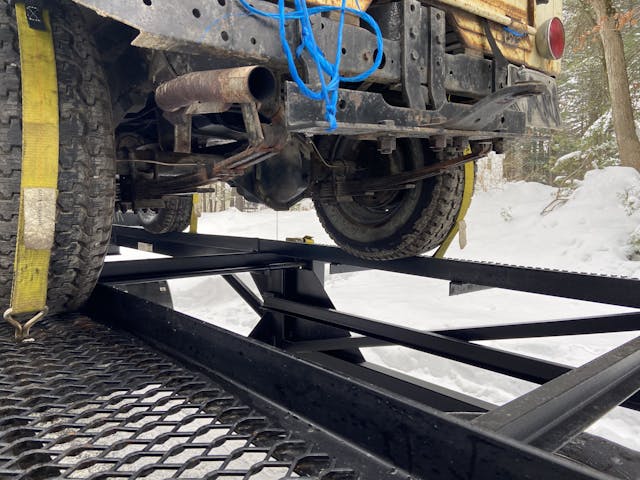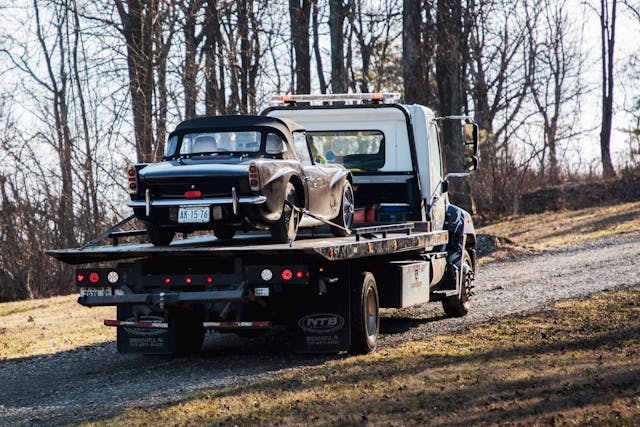Media | Articles
Shipping a car? Here’s how (and why) to make the right choice
I’ve been on the lookout for a nice, original paint Jeep CJ-5 with the 225-cu.in. “Dauntless” V-6. For the last five months, I’ve been scouring Craigslist, Facebook Marketplace and the early CJ forums for a good candidate. Because I live in New England, where even vehicles from the 2000s will corrode into a pile of dust before your eyes, my search was mostly in the parts of the country that are less susceptible to snow and road salt. I found what I was looking for: a 1966 CJ-5 Tuxedo Park Mark IV, 67,000 miles, original paint, well taken care of, at a fair price.
The big question: How to get it home?

The Options
Shipping can be a huge headache for those unfamiliar with the marketplace. There are a lot of choices out there, including different types of companies that offer different means of transporting your vehicle. In general, you have three options for hiring a shipper:
Point-to-point carriers

The concept of point-to-point shipping is simple: contract with a company that is in the business of automotive shipping, hiring them to move your car from Point A to Point B. Examples of point-to-point shippers include companies like Passport Transport or Reliable Carriers. If you’ve ever been to Barrett-Jackson or the Pebble Beach Concours d’Elegance, or any other major auto show, most of the vehicles that show up at these events were entrusted to point-to-point shippers like this. If cost were no object, and I was hauling a high-value car to an event across the country, I absolutely would have given one of these companies a call.
“We’re a high-end service,” Reliable Carriers’ Vice President and COO, Bob Sellers, told us in a phone interview. “If you’re looking for the lowest price, I’m probably not your guy, but know that your Jeep would get the same treatment as a $2 million Bugatti.”
Marketplace
Buy and sell classics with confidence
Reliable has been in the business for 61 years, and it runs a state-of-the-art fleet of 325 hard-sided, liftgate trailers. “We don’t make money hauling air,” says Sellers. Thanks to satellite tracking and advanced logistics, when they get a call from a client, they’ll deploy a truck on its way from one place to another with an empty space, quickly and efficiently.

The drivers are also a Reliable advantage. “Our average driver has been with us for 10 and a half years, and we’ve got some that have driven for us for over 30,” Sellers says, and points out that at the other end of the age spectrum, the equipment is about as modern as you can get. “Our average trailer is 4.5 years old.”
Sellers notes that about 85 percent of Reliable Carriers’ business is with OEMs like Ford, Chrysler, GM, Toyota and, more recently, Porsche. That leaves 15 percent as “personally owned vehicles,” and a lot of that business happens at events like Barrett-Jackson or the Pebble Beach auctions. “We get people who have cashed out their home equity to buy the car they’ve wanted since high school. It’s their baby,” he recognizes, and their biggest concern is getting it home safely. “Our satellite tracking means that they can monitor the car’s progress, and it saves a lot of phone calls about where the car is.”
Sounds good, right? The con, obviously is cost, and we’ll get into the details of that in a bit.
Online shipping brokers

Hop onto Google indicating you’d like to ship a car, and in an instant you’ll find hundreds of vendors willing to help. Many of these outfits will offer you an online quote in seconds. Each of these companies varies in the services they offer, and the nuances between them are important. One such popular service is uShip, which is different in that it’s actually a platform, not a shipping service in its own right, that connects with carriers that are interested in shipping your vehicle.
Online brokers are what a lot of people will use when shipping a car in the hoi polloi segment of the vintage car hobby. Cost is an object for most of us, and if we can save a couple hundred bucks shipping a $6200 vehicle, it makes a significant impact on our overall investment.
Most of these companies make it easy to get an instant understanding of how much it’s going to cost to move your vehicle from one place to another. You fill out a quote request with the particulars, including location, your vehicle, its condition and the type of transport, and either instantly or via email, you get a quote with a price. Essentially, you’re posting the vehicle you want to ship, and shippers will then come at you with quotes competing for your business to ship the car. It’s up to you to choose the one that best fits your needs.

Perhaps the most challenging element here is what author Barry Schwartz titled his 2004 book, The Paradox of Choice. It’s sort of like choosing a house to rent on AirBnB. You’re presented with dozens of options, many of which look pretty good and range in cost anywhere from “How can they make money at this” to “THEY WANT HOW MUCH?” If you do some digging into reviews on those companies that are doing the actual shipping, you’ll begin to understand the truth of the adage “You get what you pay for.” Some of the shippers at the bottom end of the cost ladder have reviews that begin with ALL-CAPS warnings like “NEVER USE THIS COMPANY.” As with anything else, reviews don’t tell the full story, but the more information you have in front of you the better.
A clear downside of this marketplace approach is well known to anyone who has filled out a request with an online mortgage vendor or an extended warranty provider. Once you’ve hit the “Submit” button, you’ll be getting emails and phone calls about your shipment from now until what will feel like the end of time.
Of course, none of this is to say that online shipping vendors are bad. At the very least it’s a good idea to get a bunch of quotes from several of them to establish a baseline understanding of what shipping your car is going to cost. And if you’re willing to do the digging to find an actual shipper with a good reputation that’s suggested by an online vendors, it’s perhaps cheapest way to get your vehicle home.
Shipping brokers

With a shipping broker, part of what you pay isn’t covering the actual shipping. A portion of your fee goes to a broker who will find you an available shipper at an agreed-upon rate, without you having to research every last detail about the company responsible for hauling your car. As with online brokers, you’re likely to get texts, calls, and emails from various shipping providers for a while when you go this route. Examples of shipping brokers include J&S Transportation and Gartho Logistics.
The principal negative with an auto shipping broker is added cost. A broker is a classic middleman. You’re paying them for the service of finding you a shipper, rather than saving that fee and finding the shipper yourself. The other potential stumbling block is that you’re not dealing directly with the company performing the intended service. In a lot of cases you won’t even know what shipping company it is, because the broker does not always disclose that information. After all, with that information you could then just go out and contract with them directly, right?
The positive, though, is that this broker’s job is to deal with shipping companies. A broker’s job is, ideally speaking, to use their connections and experience to pair you up with a carrier that’s reliable and suited to your needs. These folks are also often available 24 hours a day to help when things go sideways. The big online vendors are as well, but their business relationships are often a lot less personal than the ones that small brokers have fostered with the shippers with which they’ve worked. As with any other service provider, some brokers are better than others, so ask around for recommendations (or warnings) from people. Online reviews can also be helpful in this regard.
The cost
There are several key factors that are going to impact the cost of shipping your vehicle, and these variables apply across the board, regardless of which type of shipping service you opt to enlist:
Distance
The most consequential (and most obvious) variable is how far you’re shipping a vehicle. Shipping 200 miles is, as you’d expect, going to be a lot less expensive than shipping one 2000 miles with all other things being equal. Alternatively, if you’re within 100 miles and a good relationship with a roadside assistance provider or local towing company, you can probably figure out a way haul your car home for a lot less money (or free, as I did with a ’78 Blazer with a bad radiator that I bought about 40 miles from home.)
Open vs. closed transport

There are a lot of reasons to pay for lower-risk transport. If you’re retrieving a high-end or exotic sports car, something of great personal/sentimental value, or you’re shipping a vehicle to auction for sale, you’re probably going to prefer closed transport. Naturally, closed transport offers better protection from damage in transit, whether it be a hailstorm or road debris. Of course, if you’re willing to suffer a bit of road dirt at the very least, shipping on an open trailer is going to save you a significant amount of money.
The other thing to keep in mind is that more affordable methods of transport often mean that your car will be sharing a truck with a several other vehicles. Each of these vehicles is headed to its own destination, which introduces more stops along the way that could derail the arrival time estimate your broker or shipping company provides.
Running vs. not running
If you’ve located a one-of-one barn find that won’t move under its own power, you can still find a shipper that’s willing to pick it up. It’s just a matter of additional cost.
Size
In general, a car is a car, but size does come into the cost equation if you’re shipping something like a ’71 Cadillac Fleetwood versus a ’55 Fiat 600. If you’re buying anything four-wheel drive, like our subject CJ-5, you’re also going to be asked if it’s been lifted or if it’s riding on 44-inch Super Swampers. Such details can yield an additional fee, or it can bump you from an enclosed transport to an open trailer.
We ran a cost comparison with several of the major carriers, online shipping companies, and brokers. The particulars of our shipping job:
- 1966 Jeep CJ-5
- Open transport
- Ashland, Virginia to Holliston, Massachusetts
- 514 miles
- Starting, running and stopping
- Stock height, wheels, and tire size
Company |
Type of Shipper |
Online Quote |
|---|---|---|
| Reliable Auto Transport | Point to point carrier | $1171 |
| uShip | Online Broker | $587 to $709 |
| Gartho Logistics | Shipping Broker | $615 |
As you can see, the quote from Reliable was by far the highest, at almost twice what the smaller guys are charging. That’s nothing against Reliable; they offer a higher echelon of service they do a fantastic job. For this CJ-5 that’s worth $8000 on its best day, that’s simply more than I was willing to spend.
uShip was the cheapest, and I got 26 quotes for shipping through uShip in 24 hours. NINE of those quotes came from the same company—TempusLogix—and they ranged from $534 to $573. I’m not sure why one company would pitch me nine times with incrementally lower quotes. Regardless, you can save a few bucks shipping through uShip, but you’re going to be inundated with quotes to review. If you’re OK with that, this is the cheapest method.
Gartho Logistics ended up sending a quote in half an hour. At $615, it was certainly competitive with uShip, but I dealt with one guy, and he was super responsive via text and email. I was happy to spend the additional $75 or so to not have to wade through two dozen quotes.
Cost of shipping company vs. picking up

In the pre-pandemic Before Times™, CJ-5 retrieval would’ve been easy. My wife, my kids, and my friends have all been on vintage car acquisition missions with me, sometimes as close as the town where I live. (Once, as far as Alabama.) I’d either rent or borrow a truck and trailer, hit the road, pick up the vehicle and make a weekend adventure out of it. That was part of the fun of buying the vehicle. Times are different now, and because I’m the sole caregiver for a 91-year old parent, the idea of a long, tiring trip punctuated by human contact, cheap hotel room stays and trips into interstate restrooms just didn’t seem prudent.
Shipping was the clear choice for me in this case regardless of financial realities, but the cost of doing it this way is worth tallying up. Let me say up front that I don’t own a truck and trailer, but I am wildly fortunate that I have a network of friends and professional acquaintances that do, and getting hold of an open car trailer would be a phone call away. My situation also isn’t common because of the fact that I write about cars and trucks for a living, and I’d have no qualms with asking a manufacturer of a new truck if I could borrow it for a few days and then write about the adventure. For those reasons I’m going to put my personal cost of getting ahold of a truck and trailer at $0, but for most people this won’t be the case .
But what about the trip? It’s 515 miles between my home in Massachusetts and Ashland, Virginia. And I’d have to do that twice. It’s conceivable that I could do that in a day, but definitely not alone, and frankly, getting someone to make the trip with me during a pandemic is a tall order. I decided I’d be better off splitting the trip into two days and finding a cheap hotel room. Let’s put that cost down at $80. (Yes, I could crash in a Walmart parking lot or something, but I’m an adult with a house and two kids. I’d like to sleep in a comfortable bed and not fight anyone for the television for one night).

The big cost was fuel. Let’s settle on a conservative estimate for fuel economy: 18 mpg. That’s high, but for argument’s sake, it’ll give us a baseline of what a 1030 mile round trip would cost. To make that trip at 18mpg, I’d need just over 57 gallons of fuel. The average fuel cost between Massachusetts and Virginia is about $2.25, according to the estimates on AAA. That ends up being $128.75 for gas.
Using the highways aren’t free, either. I used the Tollsmart Toll Calculator to map the trip and figure out how much tolls would cost. The fee from Massachusetts to Virginia is $29.55. But that’s only half the story. The return trip from Virginia to Massachusetts is twice as much, because the tolls are more expensive in that direction. That adds up to $52.55.
In total, with a night in a hotel, gas and tolls, I’m up to $261.30, not including food along the way. If the average quote was $615, I’m only saving $353.70 to be in a truck for 20 hours.
Who I went with
I ended up booking the trip with Gartho Logistics. The main reason I did so was that I talked to fellow contributor Rob Siegel, who has shipped more cars in the last few years than I will in a lifetime. He mentioned that he had experience with Garry at Gartho Logistics and had great experiences with him over the years.
I did evaluate the quotes from all of the various carriers and brokers, and honestly, there was no meaningful price difference between some faceless company, and this guy who’s been in the auto transport business for 30 years. Gartho Logistics had a quote to me in short order via text, he followed up regularly and was quick to answer every question. I booked his carrier on a Friday, and the CJ5 was picked up the next day. It was at my house on a Monday.

One thing that you may want to understand before you choose a shipper: The CJ5 I shipped has a really narrow track width. It was built just before the wide-track CJs that came along in the 1970s. As a result, this CJ5 BARELY squeezed onto the trailer, which was open in the middle to allow for lighter weight. The right side tires were about half hanging over into the open space between the trailer ramps. If you’re shipping a small car, especially something sporty, you’d be wise to ask the carrier what the track width of the ramps are, and evaluate whether there’s adequate room.
Naturally, your mileage is going to vary depending on the time of the year, the distance you need to haul your vehicle and a lot of other contributing factors, but the process was painless, the cost was reasonable and the effort I had to expend to get it home was pretty minimal.
Obviously, everyone will have needs and requirements specific to their circumstances, but hopefully this explainer helps clarify how to resolve a variety of shipping concerns. Whether you need to roll out the red carpet of transport or simply require that a car to get from A to B, we all want our vehicles to arrive at their destination well cared-for and with no surprises. Go forth and ship with confidence!










